Faith and Politics
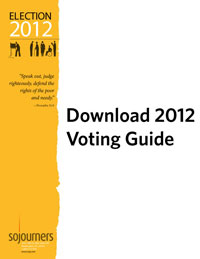 If you care about having a substantive conversation about issues that matter, you should share this post.
If you care about having a substantive conversation about issues that matter, you should share this post.
At its best, Christian faith provides a moral compass for advancing the common good. At worst, Christianity can be hijacked by partisan political agendas that divide and destroy. Sojourners encourages you to develop a robust and well-informed conscience around elections, measuring candidates and their platforms against Christian ethics and values. While we must be careful about translating scripture directly into public policy positions, there are principles and suggested approaches on a range of issues that can provide a critical framework to shape our perspective on public policy.
As we have since 2004, Sojourners has published an issues guide of principles and policies for Christian voters. We encourage you to use this guide to educate yourself on these issues. This can inform you as you write letters to candidates or to your local newspaper, call radio talk shows, and ask candidates at forums or town hall meetings questions based on these principles. Think and pray about whom, you would entrust with the responsibility to lead your community, state, and nation.
Share this with others and get ready for the conversation to begin.
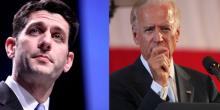
When Joe Biden and Paul Ryan face off in the vice-presidential debate Thursday night, it will mark the first showdown of its kind between the first Catholics ever to oppose each other on the major party tickets.
A “Catholic Thrilla in Manila” as a Washington Post headline put it, recalling the famous 1975 Ali-Frazier heavyweight bout in the Philippines. Store window signs in the host city of Danville, Ky., prefer the “Thrill in the Ville.”
Whatever it is called, expectations among Catholics are as high as the stakes for both campaigns.
Joseph Cella, who leads Catholic outreach for the Romney-Ryan campaign in Michigan, where the GOP ticket has nearly closed a 10-point gap, said the campaign is organizing debate-watching parties nationwide.
“I don¹t see how Vice President Biden and Congressman Ryan could avoid discussing principles of importance to Catholics,” said Cella, a veteran conservative activist.
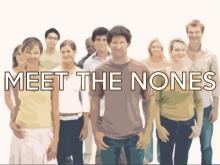
Editor's Note: Sojourners has launched this new blog series to help shed light on the nation's latest "religious" affiliation. Scroll down to read their stories. Or EMAIL US to share your own.
Which religious tradition do you most closely identify with?
- Protestant
- Catholic
- Mormon
- Muslim
- Jewish
- Orthodox
- Other Faith
- Unaffiliated
Given these options — or even if you throw in a few more like Buddhist, Hindu, Agnostic — I would choose “Unaffiliated.” That puts me into a category with one-in-five other Americans, and one-in-three millennials, aptly named the “nones.”
In that vein, I introduce our new blog series: Meet the Nones. Through this series, I hope to encourage discussion, debate, and elucidate the full picture of what it means to be losing your religion in America.
Editor's Note: Would you like to share your story on this topic? Email us HERE.
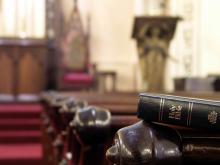
One-in-five adults in the United States — and a third of adults under 30 — say they have no religious affiliation. The numbers are out in a new report called “’Nones’ on the Rise,” put out by the Pew Forum on Religion and Public Life. That 20 percent of the population is up from 15 percent just five years ago.
But while our church membership rolls may be shrinking, “unaffiliated doesn’t necessarily mean wholly secular,” said senior researcher Cary Funk at the Religion Newswriters Association Conference in Bethesda, Md., on Saturday.
In fact, two-thirds of the 46 million Americans self-identifying as having no religion also say they believe in God. And 21 percent of them say they pray every day. A large portion of this group — 37 percent — say they consider themselves “spiritual but not religious.”
The increase in disaffiliation goes hand-in-hand with an overall lack of trust in American institutions across the board, from the government to the news media, and now, to our houses of worship.
The “nones” overwhelmingly say religious institutions are too concerned with money and power, and 67 percent say they both focus too much on rules and are too involved in politics.
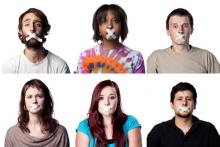
Young millennials — age 18 to 25 — are more comfortable with an evangelical than Mormon (or atheist or Muslim) president. This, according to part two of the Millennial Values Survey put out by the Public Religion Research Institute and Georgetown University’s Berkley Center.
Nearly six in 10 of those surveyed say they would be comfortable with an evangelical Christian serving as president, while 44 percent would be comfortable with a Mormon.
The numbers line up with those supporting President Barack Obama over Gov. Mitt Romeny at 55 percent to 39 percent — a spread that has actually increased 16 points since March.
But that won’t necessarily convert into votes. Nearly two-thirds of those surveyed are registered to vote, but only half report they are absolutely certain they will cast a vote in November.
The candidates’ religion isn’t the only factor affecting young peoples’ voting patterns. Another issue is a lack of voter engagement in the political process altogether.
“Millennials have a reputation for being the ‘wired’ generation, but when it comes to government, they’re unplugged,” said Daniel Cox, PRRI research director, in the news release Friday. “Across a range of measures, younger millennials indicated that they are disillusioned with the government’s ability to respond to their needs.”
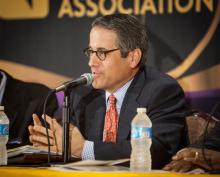
BETHESDA, Md. — With voters focused intently on pocketbook issues, both Mitt Romney and President Barack Obama are framing their faith-outreach efforts around the economy as the presidential campaign enters its final weeks.
That marks a shift from previous election cycles, campaign advisers say.
“That’s a major difference between this election and the last. The economy is the single issue that transcends every demographic, every coalition, every interest group,” said Mark DeMoss, an evangelical who has led Romney’s efforts to rally conservative Christians — a key Republican voting bloc — around the GOP nominee, who is a Mormon.
“Evangelicals are no less interested in the unemployment rate and the cost of living than non-evangelicals,” DeMoss added.
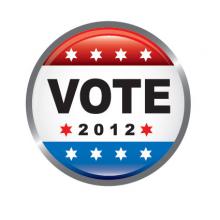
Editor's Note: This is the third article in Lisa Sharon Harper’s election season blog series, Watch the Vote. You can read the last article here.
With 28 days to go until our nation chooses its 45th president, a string of court victories have knocked down Jim-Crow-style barriers to voting that have been erected in states across the nation. But 13 states are still under the oppressive weight of laws designed to suppress the vote.
According to the Brennan Center for Justice, starting in early 2011, 41 states introduced legislation to restrict voting laws. Nineteen quietly passed 25 laws and two executive actions, some of which require government-issued photo IDs, proof of citizenship, fewer early-voting days, the elimination of Election Day voter registration, created barriers to voter registration drives, and created more obstacles for citizens with past criminal convictions.
The good news is that over the past few months we have seen one court case after another block the enactment of the worst provisions of these new Jim Crow laws. According to a recent Brennan Center study, 10 courts have blocked or blunted restrictive voting laws — and the Department of Justice blocked one more — since Oct. 3.
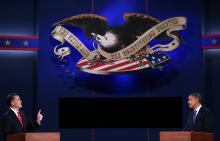
Last night millions of Americans watched the first Presidential debate of the 2012 election season. During the 90-minute debate, there were significant policy discussions about a range of issues, deep disagreements between the two candidates, and even a threat to Big Bird’s job security.
Yet despite all the arguing there was much left unsaid by President Barack Obama and Gov. Mitt Romney.
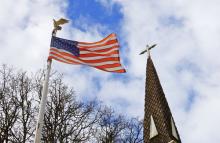
LOS ANGELES — In a matter of days, some 1,400 American pastors are planning to break the law.
And they’re likely to get away with it.
As part of “Pulpit Freedom Sunday,” on Oct. 7, religious leaders across the country will endorse political candidates — an act that flies in the face of Internal Revenue Service rules about what tax-exempt organizations, such as churches, can and cannot do.
The IRS says tax-exempt organizations, or what they refer to as a 501(c)(3), are prohibited from participating in partisan campaigning for or against political candidates. Yet, despite what’s in the rules, the agency continues to struggle to do anything about those who defy the law.
Though the regulation has been in place since 1954, in 2009, the U.S. District Court of Minnesota ruled the IRS no longer had the appropriate staff to investigate places of worship after a reorganization changed who in the agency had the authority to launch investigations.
New procedures for conducting church audits have been pending since 2009, which has left the IRS virtually impotent in conducting any kind of new investigations. The IRS did not respond to questions seeking comment.

Many people in America are poor, due to no fault of their own—and their numbers are growing.
If you really know any poor people, you know that to be true. If you don’t, the first sentence of this post runs against the grain of many cultural assumptions in America that tend to blame people for being poor.
On the eve of the first Presidential debate, Sojourners premiered The Line — a film about the new faces of poverty in America. In this powerful documentary from award-winning filmmaker Linda Midgett, those popular judgmental assumptions against poor people clearly and convincingly are debunked.
The Line, which I am asking everyone who reads this column to watch, deftly dismantles many stereotypes about poverty and shows why a growing number of Americans find themselves falling into it. The film does so by telling the personal stories of people who have fallen beneath “the line.”
My 14-year-old son Luke, watched the story of John: a banker from a failed bank who once made a six-figure salary, but who now finds himself a substitute teacher making $12,000 a year while trying to raise his three kids. John painfully talked about what it feels like to have to go to a food bank because he has no other viable choice.
His story caused Luke to ask his mom after the film, “John said he got straight A’s in school, so could that happen to me?”
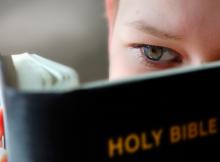
HARRISBURG, Pa. — A federal judge on Oct. 1 dismissed a lawsuit filed by an atheist group that challenged a "Year of the Bible" resolution passed early this year by Pennsylvania lawmakers.
Yet U.S. Middle District Judge Christopher C. Conner also questioned whether the resolution should have been adopted at all. The nonbinding resolution, introduced by state Rep. Rick Saccone, urges Pennsylvanians to read the Bible during 2012.
The judge dismissed the suit by the Wisconsin-based Freedom From Religion Foundation after concluding that House members have "absolute legislative immunity" in passing such measures.
Conner emphasized, however, that his decision to grant immunity "should not be viewed as judicial endorsement for this resolution. It most certainly is not."
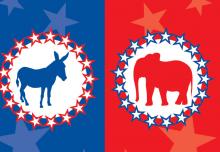
What if I told you that the political discourse in America has proven for decades what PSY’s ‘Gangnam Style’ phenomenon has proven recently? What do I mean? It is simply this: people can indeed get tirelessly excited about something that sounds good without understanding its contents.
Like every election year, 2012 seems to have its own particular set of buzzwords and slogans. From “the forgotten 47 percent” to “you did build that,” those on the left and the right are each trying to infuse the political discourse with their own partisan lingo. But it’s time somebody put a stop to the hype and asks the sensible question: “What is the real meaning behind all of this?”
Truth is, both political parties have been directing their resources to highlight their differences more than anything else. They are platforms defined by contrast, not by real facts. This should lead us to raise the question that is usually unasked (and therefore unanswered) amid the consistent heat of the American political climate: “If the government is designed ultimately for the good of the people, is the political discourse today reflective of that goal?”
To this question, the German philosopher Friedrich Nietzsche answers, “No.”

I love food. I love food even more when it's shared with people. Some of my fondest memories with friends and family happened while sharing food. My husband and I shared our first date over a meal, and we got engaged over a meal. There's something about sitting around a table partaking in sustenance for our bodies that also fills our soul and our hearts. That's probably why I love communion so much.
So I was struck by Paul’s anger over food in 1 Corinthians 11. Granted, Paul comes off angry in other letters as well, but this one I decided to linger on for awhile because of verse 27: "Whoever, therefore, eats the bread or drinks the cup of the Lord in an unworthy manner will be answerable for the body and blood of the Lord."
Paul's letter is directed to a community in Corinth that was made up of the poor, the working class, and the rich. They lived together, shared communion with each other, and sought to be a community that reflected Christ. Now, this doesn’t seem too different from what we do at church today. But unlike how we celebrate communion — as it’s own “event” during service — for the 1st century Christians, communion was part of a real meal.
So what could be so "unworthy" about this shared meal?

I started my Tennessee sabbatical with a story about three peace activists who recently shut down the Y12 bomb plant here in Oak Ridge with a stunning protest, armed only with a bible and flowers.
I figure I’ll end my sabbatical with another great story of East Tennessee mischief.
This is the story of one of my favorite flash-mob actions, which happened right here in Knoxville. And this year marks its five-year anniversary.
It all happened on May 26, 2007.
Word had begun to spread that a group of white supremacists — including members of the KKK — were converging here in Knoxville, Tenn., for a rally in a park downtown. It was on the news and in the papers.
Many locals were pretty upset by the public display of racism and hatred. Even though many of the folks connected to the hate-group were coming from other states, they had obtained a permit to gather and publicly proclaim their hate-filled message of White Power.
But they had no idea what was coming.
A group of locals had decided neither to cower away in fear nor to fight fire with fire....Instead they decided to meet hatred with humor.
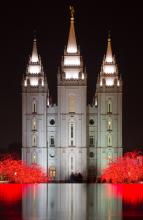
SALT LAKE CITY — A Mormon blogger accused of apostasy for writing critical web essays about Mormon history, temple worship and contemporary issues, has been given a reprieve — for now.
The church disciplinary council set for today (Sept. 30) to decide whether to excommunicate David Twede has been postponed "due to scheduling conflicts," Allan Pratt, Twede’s LDS stake president in Florida, said in a statement Thursday. "It will be rescheduled for a later date."
Twede is managing editor of MormonThink.com, where most of his critical pieces, including ones about GOP presidential nominee and fellow Mormon Mitt Romney, have appeared.
On Sept. 16, officials in the church's Hunters Creek Stake in Orlando, Fla., gave Twede a letter, summoning him to a church disciplinary council for "apostasy," which they attributed to his writings.
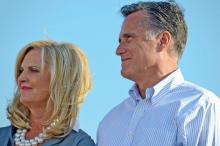
Mitt Romney angered evangelicals during his first White House run in 2008 by blurring the theological lines between their faith and his Mormonism. Lurching in the other direction, he irked them again by scarcely mentioning religion at all during this year’s GOP primaries.
But Romney has finally found some middle ground, evangelical leaders say, by sidelining theology and stressing the “Judeo-Christian values” that he shares with social conservatives.
“He’s made it very clear not to gloss over the theological differences that his faith has with evangelicals,” said Tony Perkins, president of the conservative Family Research Council in Washington. “As long as he talks about the shared values of our religious traditions, I think he’s good.”
Romney did exactly that during a Sept. 9 Meet the Press interview, saying that religion inspired him to run for president — without mentioning the word “Mormon.”
“The Judeo-Christian ethics that I was brought up with -- the sense of obligation to one’s fellow man, an absolute conviction that we are all sons and daughters of the same God and therefore in a human family — is one of the reasons I am doing what I’m doing,” he said.
Conservative Christian leaders are taking the same approach, urging evangelicals to focus on Romney’s policies and principles, not the particulars of his faith.

I’m Catholic. My father comes from a working class Irish Catholic family; my mom is from a large Catholic family of German and Lithuanian decent. My brothers, sister, and I all attended Catholic school and growing up we attended Friday fish fries during Lent and church polka fests in the summer. I’m an active member of a Catholic church in St. Paul. And soon, my wife and I will celebrate the baptism of our daughter into the Catholic Church.
I’m also voting no on the anti-marriage and voter restriction amendments.
Some have asked how I can embrace a faith whose leadership has taken such a hard line against gay and lesbian equality, and which is painfully quiet on the threat to limit voting rights. I understand why people ask this question. For me, my decision to vote no is not in spite of my Catholic faith, it’s because of it.
When I was 10 my parents divorced. A couple years later my mom came out to my family as lesbian. By then she no longer felt welcome at church and stopped going to mass, though she has remained a deeply spiritual person. This one case of social exclusion is deeply meaningful to me, but is nothing compared to political decision by church leadership to spend millions of dollars to limit the freedom to marry in Minnesota. By doing so church leaders seek to permanently exclude gays and lesbians from the civil rights and benefits straight couples enjoy.
But here’s the thing: I’m still getting my daughter baptized. And I’m still Catholic. And I’m still voting no on both amendments in November.
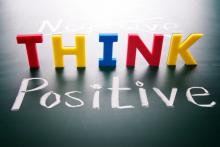
I’m a fan of TIME Magazine. It offers concise, intelligent summaries and opinions on the news that help keep me up with current events. They had an interesting article in the last few weeks about the factors that seem to affect a political party’s election results in the upcoming cycle. From their findings, it’s the party perceived to be most optimistic about the nation’s future that tends to come out on top. A fascinating bit of psychology, if not necessarily scientifically rigorous in its conclusions.
And then, in the most recent issue, there’s a pages-long piece by Bill Clinton called “The Case for Optimism,” which outlined five reasons to look ahead with hope toward our collective future. Coincidence? Maybe. But the timing of the two pieces, particularly only weeks out from a presidential election, seems more than a little bit opportunistic.
Call me cynical, but never let it be said that I’m above holding the Democrats’ feet to the fire when they pander. Yes, both parties do it, but it seems to me it’s most effective when it’s a little less in-your-face about it. President Obama rode a tide of optimism into the White House four years ago, only to watch his support erode after the reality didn’t live up to the speeches in many cases. But we wanted to hear it, and it worked. So it’s no surprise they’re giving it another go-round.
But are there grounds for such high hopes?
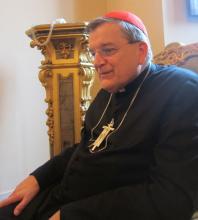
When some American Catholics worry that the hierarchy is tilting toward the Republican Party, or taking the church back to the 19th century (or earlier), they often point to Cardinal Raymond Burke as Exhibit A.
That’s understandable, because love him or loathe him — and few are on the fence — Burke’s many pronouncements on politics and the culture wars have given both fans and critics plenty of ammunition for their respective views.
Back when he was archbishop of St. Louis in 2004, for instance, Burke touched off a fierce debate by declaring that Catholic politicians such as John Kerry who support abortion rights should be denied Communion. Voters who supported them were in grave peril too, he added.
Burke doubled down on those views after Pope Benedict XVI appointed him to a top Vatican job in 2008, saying that under President Obama the Democratic party “risks transforming itself definitively into a ‘party of death’.” In 2009, Burke fueled another controversy when he said that the late Sen. Edward Kennedy should have been denied a church funeral for his support of abortion rights and gay rights.
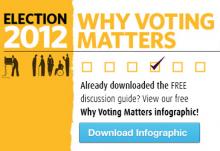
At its best, Christian faith provides a moral compass for advancing the common good. At worst, Christianity can be hijacked by partisan political agendas that divide and destroy. Sojourners encourages you to develop a robust and well-informed conscience around elections, measuring candidates and their platforms against Christian ethics and values. While we must be careful about translating scripture directly into public policy positions, there are principles and suggested approaches on a range of issues that can provide a critical framework to shape our perspective on public policy.
As we have since 2004, Sojourners has published an issues guide of principles and policies for Christian voters. We encourage you to use this guide to educate yourself on these issues. This can inform you as you write letters to candidates or to your local newspaper, call radio talk shows, and ask candidates at forums or town hall meetings questions based on these principles. Think and pray about whom, you would entrust with the responsibility to lead your community, state, and nation.